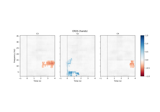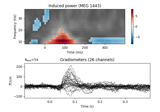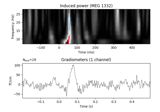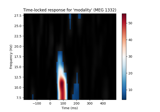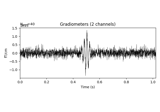mne.time_frequency.EpochsTFR¶
-
class
mne.time_frequency.EpochsTFR(info, data, times, freqs, comment=None, method=None, events=None, event_id=None, metadata=None, verbose=None)[source]¶ Container for Time-Frequency data on epochs.
Can for example store induced power at sensor level.
- Parameters
- info
Info The measurement info.
- data
ndarray, shape (n_epochs, n_channels, n_freqs, n_times) The data.
- times
ndarray, shape (n_times,) The time values in seconds.
- freqs
ndarray, shape (n_freqs,) The frequencies in Hz.
- comment
str|None, defaultNone Comment on the data, e.g., the experimental condition.
- method
str|None, defaultNone Comment on the method used to compute the data, e.g., morlet wavelet.
- events
ndarray, shape (n_events, 3) |None The events as stored in the Epochs class. If None (default), all event values are set to 1 and event time-samples are set to range(n_epochs).
- event_id
dict|None Example: dict(auditory=1, visual=3). They keys can be used to access associated events. If None, all events will be used and a dict is created with string integer names corresponding to the event id integers.
- metadatainstance of
pandas.DataFrame|None A
pandas.DataFramecontaining pertinent information for each trial. Seemne.Epochsfor further details.- verbosebool,
str,int, orNone If not None, override default verbose level (see
mne.verbose()and Logging documentation for more). If used, it should be passed as a keyword-argument only.
- info
- Attributes
- infoinstance of
Info Measurement info.
ch_nameslistChannel names.
- data
ndarray, shape (n_epochs, n_channels, n_freqs, n_times) The data array.
- times
ndarray, shape (n_times,) The time values in seconds.
- freqs
ndarray, shape (n_freqs,) The frequencies in Hz.
- comment
str Comment on dataset. Can be the condition.
- method
str|None, defaultNone Comment on the method used to compute the data, e.g., morlet wavelet.
- events
ndarray, shape (n_events, 3) |None Array containing sample information as event_id
- event_id
dict|None Names of conditions correspond to event_ids
metadatapandas.DataFrame, shape (n_events, n_cols) |NoneGet the metadata.
- Notes
- —–
- .. versionadded:: 0.13.0
- infoinstance of
Methods
__contains__(ch_type)Check channel type membership.
__getitem__(item)Return an Epochs object with a copied subset of epochs.
__hash__()Hash the object.
__iter__()Facilitate iteration over epochs.
__len__()Return the number of epochs.
add_channels(add_list[, force_update_info])Append new channels to the instance.
apply_baseline(baseline[, mode, verbose])Baseline correct the data.
average()Average the data across epochs.
copy()Return a copy of the instance.
crop([tmin, tmax, fmin, fmax, include_tmax])Crop data to a given time interval in place.
drop_channels(ch_names)Drop channel(s).
get_channel_types([picks, unique, only_data_chs])Get a list of channel type for each channel.
Get a DigMontage from instance.
next([return_event_id])Iterate over epoch data.
pick(picks[, exclude])Pick a subset of channels.
pick_channels(ch_names[, ordered])Pick some channels.
pick_types([meg, eeg, stim, eog, ecg, emg, …])Pick some channels by type and names.
reorder_channels(ch_names)Reorder channels.
save(fname[, overwrite])Save TFR object to hdf5 file.
-
__contains__(ch_type)[source]¶ Check channel type membership.
- Parameters
- ch_type
str Channel type to check for. Can be e.g. ‘meg’, ‘eeg’, ‘stim’, etc.
- ch_type
- Returns
- inbool
Whether or not the instance contains the given channel type.
Examples
Channel type membership can be tested as:
>>> 'meg' in inst True >>> 'seeg' in inst False
-
__getitem__(item)[source]¶ Return an Epochs object with a copied subset of epochs.
- Parameters
- item
slice, array_like,str, orlist See below for use cases.
- item
- Returns
- epochsinstance of
Epochs See below for use cases.
- epochsinstance of
Notes
Epochs can be accessed as
epochs[...]in several ways:epochs[idx]: ReturnEpochsobject with a subset of epochs (supports single index and python-style slicing).epochs['name']: ReturnEpochsobject with a copy of the subset of epochs corresponding to an experimental condition as specified by ‘name’.If conditions are tagged by names separated by ‘/’ (e.g. ‘audio/left’, ‘audio/right’), and ‘name’ is not in itself an event key, this selects every event whose condition contains the ‘name’ tag (e.g., ‘left’ matches ‘audio/left’ and ‘visual/left’; but not ‘audio_left’). Note that tags selection is insensitive to order: tags like ‘auditory/left’ and ‘left/auditory’ will be treated the same way when accessed.
epochs[['name_1', 'name_2', ... ]]: ReturnEpochsobject with a copy of the subset of epochs corresponding to multiple experimental conditions as specified by'name_1', 'name_2', ....If conditions are separated by ‘/’, selects every item containing every list tag (e.g. [‘audio’, ‘left’] selects ‘audio/left’ and ‘audio/center/left’, but not ‘audio/right’).
epochs['pandas query']: ReturnEpochsobject with a copy of the subset of epochs (and matching metadata) that matchpandas querycalled withself.metadata.eval, e.g.:epochs["col_a > 2 and col_b == 'foo'"]
This is only called if Pandas is installed and
self.metadatais apandas.DataFrame.New in version 0.16.
-
__iter__()[source]¶ Facilitate iteration over epochs.
This method resets the object iteration state to the first epoch.
Notes
This enables the use of this Python pattern:
>>> for epoch in epochs: >>> print(epoch)
Where
epochis given by successive outputs ofmne.Epochs.next().
-
__len__()[source]¶ Return the number of epochs.
- Returns
- n_epochs
int The number of remaining epochs.
- n_epochs
Notes
This function only works if bad epochs have been dropped.
Examples
This can be used as:
>>> epochs.drop_bad() >>> len(epochs) 43 >>> len(epochs.events) 43
-
add_channels(add_list, force_update_info=False)[source]¶ Append new channels to the instance.
- Parameters
- add_list
list A list of objects to append to self. Must contain all the same type as the current object.
- force_update_infobool
If True, force the info for objects to be appended to match the values in
self. This should generally only be used when adding stim channels for which important metadata won’t be overwritten.New in version 0.12.
- add_list
- Returns
See also
Notes
If
selfis a Raw instance that has been preloaded into anumpy.memmapinstance, the memmap will be resized.
-
apply_baseline(baseline, mode='mean', verbose=None)[source]¶ Baseline correct the data.
- Parameters
- baselinearray_like, shape (2,)
The time interval to apply rescaling / baseline correction. If None do not apply it. If baseline is (a, b) the interval is between “a (s)” and “b (s)”. If a is None the beginning of the data is used and if b is None then b is set to the end of the interval. If baseline is equal to (None, None) all the time interval is used.
- mode‘mean’ | ‘ratio’ | ‘logratio’ | ‘percent’ | ‘zscore’ | ‘zlogratio’
Perform baseline correction by
subtracting the mean of baseline values (‘mean’)
dividing by the mean of baseline values (‘ratio’)
dividing by the mean of baseline values and taking the log (‘logratio’)
subtracting the mean of baseline values followed by dividing by the mean of baseline values (‘percent’)
subtracting the mean of baseline values and dividing by the standard deviation of baseline values (‘zscore’)
dividing by the mean of baseline values, taking the log, and dividing by the standard deviation of log baseline values (‘zlogratio’)
- verbosebool,
str,int, orNone If not None, override default verbose level (see
mne.verbose()and Logging documentation for more). If used, it should be passed as a keyword-argument only. Defaults to self.verbose.
- Returns
- instinstance of
AverageTFR The modified instance.
- instinstance of
Examples using
apply_baseline:
-
average()[source]¶ Average the data across epochs.
- Returns
- aveinstance of
AverageTFR The averaged data.
- aveinstance of
Examples using
average:
-
property
ch_names¶ Channel names.
-
property
compensation_grade¶ The current gradient compensation grade.
-
copy()[source]¶ Return a copy of the instance.
- Returns
- copyinstance of
EpochsTFR| instance ofAverageTFR A copy of the instance.
- copyinstance of
-
crop(tmin=None, tmax=None, fmin=None, fmax=None, include_tmax=True)[source]¶ Crop data to a given time interval in place.
- Parameters
- tmin
float|None Start time of selection in seconds.
- tmax
float|None End time of selection in seconds.
- fmin
float|None Lowest frequency of selection in Hz.
New in version 0.18.0.
- fmax
float|None Highest frequency of selection in Hz.
New in version 0.18.0.
- include_tmaxbool
If True (default), include tmax. If False, exclude tmax (similar to how Python indexing typically works).
New in version 0.19.
- tmin
- Returns
- instinstance of
AverageTFR The modified instance.
- instinstance of
Examples using
crop:
-
drop_channels(ch_names)[source]¶ Drop channel(s).
- Parameters
- Returns
See also
Notes
New in version 0.9.0.
-
get_channel_types(picks=None, unique=False, only_data_chs=False)[source]¶ Get a list of channel type for each channel.
- Parameters
- picks
str|list|slice|None Channels to include. Slices and lists of integers will be interpreted as channel indices. In lists, channel type strings (e.g.,
['meg', 'eeg']) will pick channels of those types, channel name strings (e.g.,['MEG0111', 'MEG2623']will pick the given channels. Can also be the string values “all” to pick all channels, or “data” to pick data channels. None (default) will pick all channels.- uniquebool
Whether to return only unique channel types. Default is
False.- only_data_chsbool
Whether to ignore non-data channels. Default is
False.
- picks
- Returns
- channel_types
list The channel types.
- channel_types
-
get_montage()[source]¶ Get a DigMontage from instance.
- Returns
- montage
None|str|DigMontage A montage containing channel positions. If str or DigMontage is specified, the channel info will be updated with the channel positions. Default is None. See also the documentation of
mne.channels.DigMontagefor more information.
- montage
-
property
metadata¶ Get the metadata.
-
pick(picks, exclude=())[source]¶ Pick a subset of channels.
- Parameters
- picks
str|list|slice|None Channels to include. Slices and lists of integers will be interpreted as channel indices. In lists, channel type strings (e.g.,
['meg', 'eeg']) will pick channels of those types, channel name strings (e.g.,['MEG0111', 'MEG2623']will pick the given channels. Can also be the string values “all” to pick all channels, or “data” to pick data channels. None (default) will pick all channels.- exclude
list|str Set of channels to exclude, only used when picking based on types (e.g., exclude=”bads” when picks=”meg”).
- picks
- Returns
-
pick_channels(ch_names, ordered=False)[source]¶ Pick some channels.
- Parameters
- Returns
See also
Notes
The channel names given are assumed to be a set, i.e. the order does not matter. The original order of the channels is preserved. You can use
reorder_channelsto set channel order if necessary.New in version 0.9.0.
-
pick_types(meg=None, eeg=False, stim=False, eog=False, ecg=False, emg=False, ref_meg='auto', misc=False, resp=False, chpi=False, exci=False, ias=False, syst=False, seeg=False, dipole=False, gof=False, bio=False, ecog=False, fnirs=False, csd=False, include=(), exclude='bads', selection=None, verbose=None)[source]¶ Pick some channels by type and names.
- Parameters
- megbool |
str If True include MEG channels. If string it can be ‘mag’, ‘grad’, ‘planar1’ or ‘planar2’ to select only magnetometers, all gradiometers, or a specific type of gradiometer.
- eegbool
If True include EEG channels.
- stimbool
If True include stimulus channels.
- eogbool
If True include EOG channels.
- ecgbool
If True include ECG channels.
- emgbool
If True include EMG channels.
- ref_megbool |
str If True include CTF / 4D reference channels. If ‘auto’, reference channels are included if compensations are present and
megis not False. Can also be the string options for themegparameter.- miscbool
If True include miscellaneous analog channels.
- respbool
If True include response-trigger channel. For some MEG systems this is separate from the stim channel.
- chpibool
If True include continuous HPI coil channels.
- excibool
Flux excitation channel used to be a stimulus channel.
- iasbool
Internal Active Shielding data (maybe on Triux only).
- systbool
System status channel information (on Triux systems only).
- seegbool
Stereotactic EEG channels.
- dipolebool
Dipole time course channels.
- gofbool
Dipole goodness of fit channels.
- biobool
Bio channels.
- ecogbool
Electrocorticography channels.
- fnirsbool |
str Functional near-infrared spectroscopy channels. If True include all fNIRS channels. If False (default) include none. If string it can be ‘hbo’ (to include channels measuring oxyhemoglobin) or ‘hbr’ (to include channels measuring deoxyhemoglobin).
- csdbool
EEG-CSD channels.
- include
listofstr List of additional channels to include. If empty do not include any.
- exclude
listofstr|str List of channels to exclude. If ‘bads’ (default), exclude channels in
info['bads'].- selection
listofstr Restrict sensor channels (MEG, EEG) to this list of channel names.
- verbosebool,
str,int, orNone If not None, override default verbose level (see
mne.verbose()and Logging documentation for more). If used, it should be passed as a keyword-argument only. Defaults to self.verbose.
- megbool |
- Returns
See also
Notes
New in version 0.9.0.
